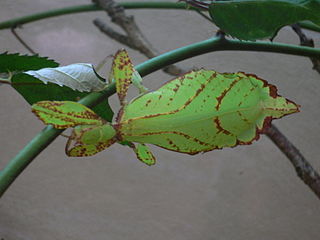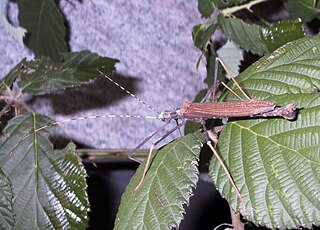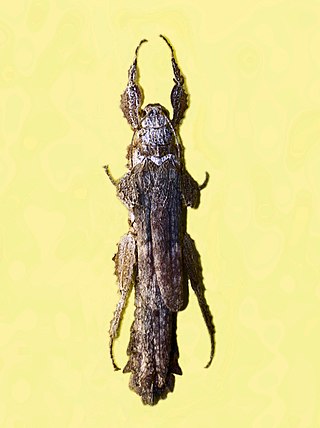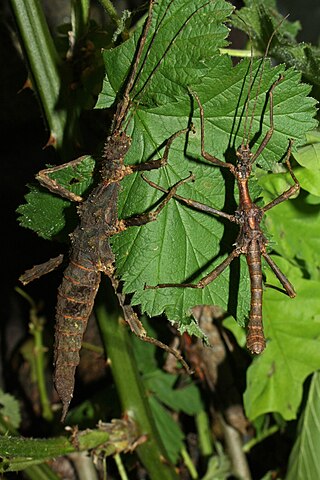
Richard Ray Larsen is an American politician serving as the United States representative for Washington's 2nd congressional district since 2001. A member of the Democratic Party, Larsen is the ranking member of the House Transportation and Infrastructure Committee.

The family Phylliidae contains the extant true leaf insects or walking leaves, which include some of the most remarkably camouflaged leaf mimics (mimesis) in the entire animal kingdom. They occur from South Asia through Southeast Asia to Australia. Earlier sources treat Phylliidae as a much larger taxon, containing genera in what are presently considered to be several different families.

Phyllium is the largest and most widespread genus of leaf insects in the family Phylliidae (Phasmatodea). They can be found in Sundaland, Philippine Islands, Wallacea, and Australasia.

Pseudophasmatidae is a family of stick insect, in the suborder Verophasmatodea, commonly called the "striped walkingsticks". An important identifying characteristic is its mesothorax, which is never more than three times as long as the prothorax.
Phobaeticus chani, the Chan's megastick, is a species of stick insect in the tribe Pharnaciini, native to the southeast Asian island of Borneo. It is one of the longest insects in the world and was once considered the record-holder. One specimen held in the Natural History Museum in London measures 56.7 cm (22.3 in). This measurement is, however, with the front legs fully extended. The body alone still measures an impressive 35.7 cm (14.1 in).

Prisopus is a genus of stick insects belonging to the family Prisopodidae. These stick insects are present in Central and South America, India and Malesia.

Phryganistria is a genus of stick insects belonging to the subfamily Clitumninae, native to northeastern South Asia, northern Mainland Southeast Asia, and southern China. The species in this genus range in size from fairly large to very large.
Lopaphus srilankensis, is a species of phasmid or stick insect of the genus Lopaphus. It is found in Sri Lanka. Two subspecies documented. It was first found from Anuradhapura.
Parasipyloidea minuta is a species of phasmid or stick insect of the genus Parasipyloidea. It is found in Sri Lanka.
Parasipyloidea zehntneri, or the thin grass stick insect, is a species of phasmid or stick insect of the genus Parasipyloidea. It is found in Sri Lanka.
Ramulus braggi, is a species of phasmid or stick insect. It is found in Sri Lanka.

The Clitumninae are a sub-family of stick insects in the family Phasmatidae found in Asia. The type genus Clitumnus is now considered a synonym of Ramulus.

The Lonchodinae are a subfamily of stick insects in the family Lonchodidae found in: Australasia, Asia, Africa, Southern America and the Pacific.

The Megacraniinae are an anareolate subfamily of stick insects in the family Phasmatidae. Their known distribution includes Malesia and islands in the Pacific and Indian oceans. Several genera have been revised and were placed previously in the Platycraninae.
Parasipyloidea is a genus of phasmids belonging to the family Lonchodidae.

Trachyaretaon is a genus of stick insects native to the Philippines.

Brasidas is a genus of stick insects that is native to the Philippines and is named after the Spartan general Brasidas

The Cladomorphinae are a subfamily of stick insects in the family Phasmatidae. This taxon is particularly well represented in the Neotropical region, but records also exist for Madagascar, Java and the Maluku Islands.
Cnipsomorpha is a genus of Asian stick insects in the tribe Medaurini, erected by Hennemann, Conle, Zhang and Liu in 2008. Species have been recorded from: southern China and Vietnam.











